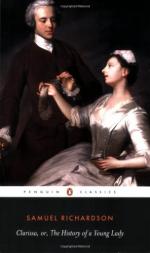Col. I own, Mr. Lovelace, the truth of what you observed just now, that I am not thoroughly acquainted with all that has passed between you and my cousin. But permit me to say, that when I first heard that you made your addresses to her, I knew but of one objection against you; that, indeed, a very great one: and upon a letter sent me, I gave her my free opinion upon that subject.* But had it not been for that, I own, that, in my private mind, there could not have been a more suitable match: for you are a gallant gentleman, graceful in your person, easy and genteel in your deportment, and in your family, fortunes, and expectations, happy as a man can wish to be. Then the knowledge I had of you in Italy (although, give me leave to say, your conduct there was not wholly unexceptionable) convinces me that you are brave: and few gentlemen come up to you in wit and vivacity. Your education has given you great advantages; your manners are engaging, and you have travelled; and I know, if you’ll excuse me, you make better observations than you are governed by. All these qualifications make it not at all surprising that a young lady should love you: and that this love, joined to that indiscreet warmth wherewith my cousin’s friends would have forced her inclinations in favour of men who are far your inferiors in the qualities I have named, should throw herself upon your protection. But then, if there were these two strong motives, the one to induce, the other to impel, her, let me ask you, Sir, if she were not doubly entitled to generous usage from a man whom she chose for her protector; and whom, let me take the liberty to say, she could so amply reward for the protection he was to afford her?
* See Vol. IV. Letter XIX.
Lovel. Miss Clarissa Harlowe was entitled, Sir, to have the best usage that man could give her. I have no scruple to own it. I will always do her the justice she so well deserves. I know what will be your inference; and have only to say, that time past cannot be recalled; perhaps I wish it could.
The Colonel then, in a very manly strain, set forth the wickedness of attempting a woman of virtue and character. He said, that men had generally too many advantages from the weakness, credulity, and inexperience of the fair sex: that their early learning, which chiefly consisted in inflaming novels, and idle and improbable romances, contributed to enervate and weaken their minds: that his cousin, however, he was sure, was above the reach of common seduction, and not to be influenced to the rashness her parents accused her of, by weaker motives than their violence, and the most solemn promises on my part: but, nevertheless, having those motives, and her prudence (eminent as it was) being rather the effect of constitution than experience, (a fine advantage, however, he said, to ground an unblamable future life upon,) she might not be apprehensive of bad designs in a man she loved: it was, therefore, a very heinous thing to abuse the confidence of such a woman.




